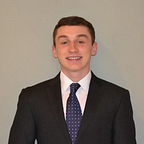Burmese Days
The Alter Fellowship Experience in Myanmar
When I joined McKinsey in 2016, I did not envision a career that would land me on the hardwood floor of a village chief’s home in rural Myanmar. Nevertheless, I found myself there while on a field visit with Frontiir, the first ISP in Yangon to make wireless connectivity ubiquitous and affordable. My team and I were gathering data on consumer demand for WiFi as part of Frontiir’s push into suburban and rural areas. This expansion will strengthen the growth of a young company that already reaches 500,000 households, boost national internet penetration rates that have risen from 1% to more than 28% since 2012, and improve the economic prospects of communities in a country that ranks 163rd in GDP per capita. In bringing its mesh WiFi technology to these populations, Frontiir will pioneer a new business model for rural connectivity and hopefully trigger further investment in the space.
Although choosing to work in Myanmar through the Alter Fellowship seemed unconventional, it offered much of what I was looking for in the next step of my career. I wanted to work with and learn from a mission-driven entrepreneur like Frontiir’s Godfrey Tan, who left a successful career at Intel to help create a more connected Myanmar. I was looking to dive into tech and work for a high-growth company, drawing a contrast with my generalist role at one of the world’s largest consulting firms. I wanted to deviate from my stable, structured path and take a risk in a new, exciting, and uncomfortable environment. More specifically, I wanted to experience the thriving startup ecosystem in Southeast Asia and work in the region’s fastest-growing economy.
There’s palpable excitement in Myanmar about the prospects of a country that only five years ago shed authoritarian rule and opened key markets to foreign investment. This enthusiasm manifests itself in a striking appetite for collaboration. In my research for the expansion project, I have spent hours in meetings with corporates, NGOs, and entrepreneurs. My barrage of questions has been met not with gruffness or requests for compensation, but with curiosity and offers to contribute more. Yangon locals demonstrate an optimistic, though cautious, attitude towards the world’s increasing interest in their country. When sharing that I am an American, the most common reaction I get is an excited “How did you hear about Myanmar?”
Despite the atmosphere of optimism, operating in a frontier market comes with challenges. There are cultural nuances to uncover, like learning that “Have you had your lunch yet?” is a common greeting and not reflective of some strange fixation with your eating habits. And there are differences in working styles to navigate, like when encountering dramatically different attitudes towards giving and receiving feedback. There’s a dearth of quality data, resulting in hours spent digging for nonexistent figures before resorting to imperfect assumptions. Poor infrastructure makes it hard to reach rural communities, and skepticism of outsiders makes these communities harder to serve. If you overcome all the rest, a convoluted regulatory system can delay the implementation of your ideas for months.
When I have encountered these challenges, it has been helpful to remember the many ways in which my time in Myanmar has delivered on its promise. I have gotten to be part of a team that is dedicated to a mission of “bridging the global digital divide.” I have adapted to and confidently operated in a foreign environment, in my professional life and my personal life. I have navigated the ambiguity of working in a fast-growing company and tackled technical concepts that once intimidated me. In doing so, I have gained clarity in my career goals and my desire to continue working with mission-driven startups.
Perhaps most importantly, I have been rewarded with the “holy sh*t, I’m in Myanmar” moments: when I find myself looking around a village chief’s house in awe and smiling to myself, “How the hell did I get to be here?”
Dan Stewart is a member of the inaugural class of Alter Fellows. Based in Yangon, Myanmar, he is working with Frontiir, an ISP that is leapfrogging wired infrastructure to provide affordable connectivity to the general populace. Prior to joining Alter, he worked in McKinsey & Company’s Washington, D.C. office after graduating from Duke University. He was born and raised in the Philadelphia area.
Alter finds and scales the best tech businesses in the developing world. Their purpose is to support not just high-growth ventures, but high-character founders who are defying all odds to not just build their companies, but build their countries and inspire others to do the same.
